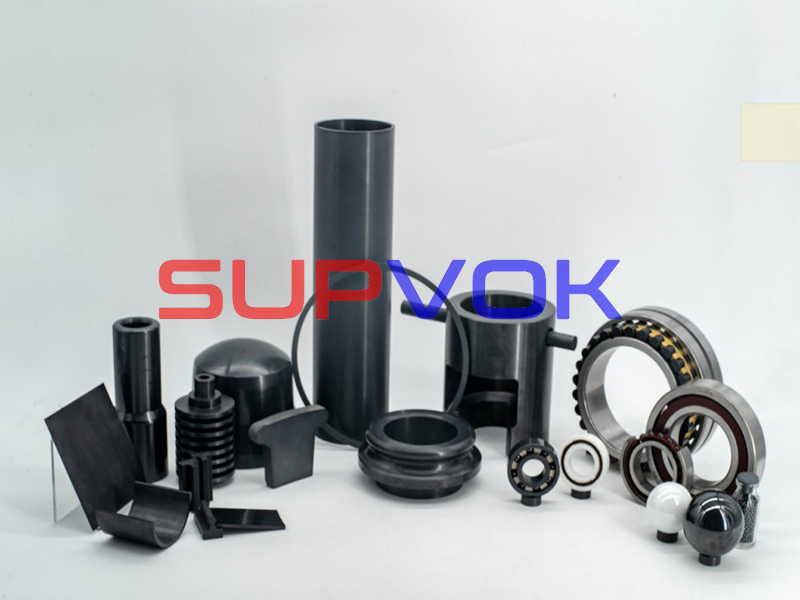Silicon nitride ceramics are gaining popularity due to their diverse applications and high performance properties. From energy and the environment to the automotive industry, these advanced ceramics play a vital role in enhancing performance, durability and efficiency. In this blog, we will explore the various applications of silicon nitride ceramics and delve into the unique characteristics that set them apart in the market.
One of the main applications of silicon nitride ceramics is the polysilicon reaction reduction furnace. These furnaces require insulating rings, heat shields and insulating bushings that can withstand high temperatures and provide a long service life. Silicon nitride ceramics have proven to be an excellent choice for these components due to their high temperature resistance and durability. By using silicon nitride ceramics, not only can the replacement frequency be reduced, but also cost can be saved, making it an optimal solution for energy and environment related applications.
Another area where silicon nitride ceramics shine is the aluminum foundry industry. The denseness, high temperature strength, thermal shock resistance and corrosion resistance of these ceramics make them highly sought after in various equipment components in this industry. The company has developed a series of high-performance silicon nitride ceramic products tailored for aluminum casting. Silicon nitride risers, heater protection tubes, shafts, rotors and thermocouple protection tubes are some examples of how these ceramics can be used to improve the efficiency and reliability of aluminum casting processes.
Hybrid ceramic bearings, especially those with silicon nitride balls, are also gaining popularity in the market. These bearings have many advantages such as high speed, light weight, self-lubrication, maintenance-free operation and electrical insulation. These properties make them particularly suitable for spindle bearings used in machine tools. The use of silicon nitride ceramics in hybrid bearings not only improves overall performance, but also helps improve energy efficiency and extend product life.
In the automotive industry, silicon nitride ceramics are used in various components. Automotive diesel engines, ceramic brake discs, engine PCU power control systems, and ceramic substrates are some examples of these ceramic applications. Silicon nitride ceramics have a unique combination of properties that make them ideal for these applications. They have high thermal conductivity, with a strength ranging from 600 to 800MPa, a fracture toughness of 6.0-8.0Mpa m1/2, and a thermal conductivity of 80-100/[(mK)], which can cope with the harsh conditions of the automotive environment. In addition, their at least 300 The current carrying capacity and thermal resistance of ≤0.5 (0.5 m Cu)(°C/W) further contribute to its suitability for automotive applications.
In conclusion, silicon nitride ceramics have revolutionized several industries by providing superior performance and durability. Whether insulating components for energy and environmental applications, equipment components for the aluminum foundry industry, spindle bearings for machine tools, or various automotive components, these ceramics have excellent essential properties. With its high thermal conductivity, strength, fracture toughness and electrical insulating capabilities, silicon nitride ceramics continue to be at the forefront of advanced ceramics, meeting the growing demands of various industries.
Properties and Applications of Silicon Nitride Ceramics
(1) Si3N4 ceramic material has high temperature and wear resistance, and is used in the preparation of rotors, stators and scroll tubes of gas turbines in ceramic engines; in non-water-cooled ceramic engines, hot-pressed Si3N4 is used as the piston top cover; reaction sintered Si3N4 can be used As a burner, it can also be used as spark plugs, piston cover tops, cylinder liners, auxiliary combustion chambers, and parts of piston-turbine combined aeroengines for diesel engines.
(2) Si3N4 ceramic material has the characteristics of good wear resistance, high strength, and small friction coefficient. It has relatively high bending strength and high hardness. At the same time, it has low friction coefficient, self-lubrication, and small friction coefficient (only 0.1). Therefore, it can be widely used in the machinery industry, such as manufacturing bearings, balls, rollers, ball races, high-temperature bolts, tools and molds, plunger pumps, sealing materials, etc.
(3) The chemical stability of Si3N4 ceramic material is very good, it is resistant to the corrosion of all inorganic acids other than hydrofluoric acid and some lye, and is not affected by molten metal alloys such as lead, aluminum, tin, silver, brass, nickel, etc. Infiltration and corrosion. Therefore, it can be widely used in the preparation of corrosion-resistant and wear-resistant parts in the chemical industry, such as ball valves, sealing rings, filters, heat exchanger components, pipes, catalyst carriers, etc.
(4) The high temperature resistivity of Si3N4 ceramic material is relatively high (1013-1014Ω cm), on the one hand, it can be used as a better insulating material; at the same time, it can also be used in electronics, military and nuclear industries, such as switch circuit substrates, thin films Capacitors, high-temperature insulators, radar radomes, missile nozzles, barrel linings, nuclear reactor supports, etc.
In addition, Si3N4 ceramics can also be used as heat engine materials, cutting tools, advanced refractory materials, etc.
Post time: Jun-21-2023





